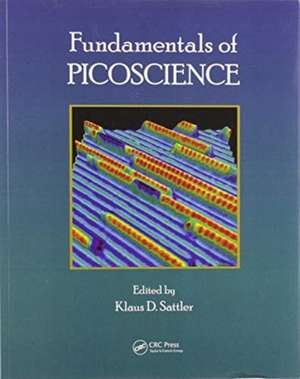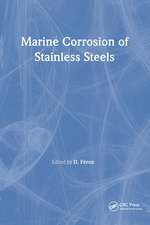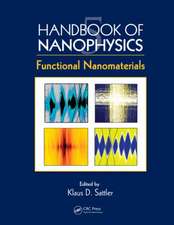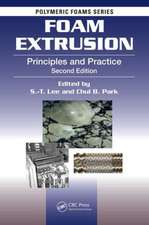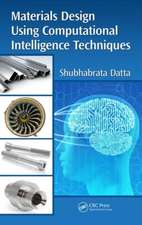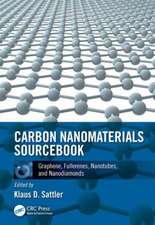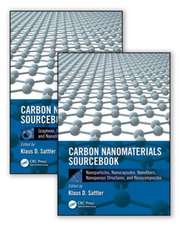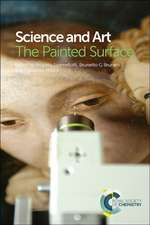Fundamentals of Picoscience
Editat de Klaus D. Sattleren Limba Engleză Paperback – 30 iun 2020
One picometer is the length of a trillionth of a meter. Compared to a human cell of typically ten microns, this is roughly ten million times smaller. In this state-of-the-art book, international scientists and researchers at the forefront of the field present the materials and methods used at the picoscale. They address the key challenges in developing new instrumentation and techniques to visualize and measure structures at this sub-nanometer level. With numerous figures, the book will help you:
- Understand how picoscience is an extension of nanoscience
- Determine which experimental technique to use in your research
- Connect basic studies to the development of next-generation picoelectronic devices
The book covers various approaches for detecting, characterizing, and imaging at the picoscale. It then presents picoscale methods ranging from scanning tunneling microscopy (STM) to spectroscopic approaches at sub-nanometer spatial and energy resolutions. It also covers novel picoscale structures and picometer positioning systems. The book concludes with picoscale device applications, including single molecule electronics and optical computers. Introductions in each chapter explain basic concepts, define technical terms, and give context to the main material.
| Toate formatele și edițiile | Preț | Express |
|---|---|---|
| Paperback (1) | 513.53 lei 6-8 săpt. | |
| CRC Press – 30 iun 2020 | 513.53 lei 6-8 săpt. | |
| Hardback (1) | 1236.90 lei 6-8 săpt. | |
| CRC Press – 26 sep 2013 | 1236.90 lei 6-8 săpt. |
Preț: 513.53 lei
Nou
Puncte Express: 770
Preț estimativ în valută:
98.28€ • 102.22$ • 81.13£
98.28€ • 102.22$ • 81.13£
Carte tipărită la comandă
Livrare economică 14-28 aprilie
Preluare comenzi: 021 569.72.76
Specificații
ISBN-13: 9780367576301
ISBN-10: 0367576309
Pagini: 764
Dimensiuni: 219 x 276 mm
Greutate: 2.28 kg
Ediția:1
Editura: CRC Press
Colecția CRC Press
ISBN-10: 0367576309
Pagini: 764
Dimensiuni: 219 x 276 mm
Greutate: 2.28 kg
Ediția:1
Editura: CRC Press
Colecția CRC Press
Cuprins
Picoscale Detection: Picometer Detection by Adaptive Holographic Interferometry. Single Atom in an Optical Cavity: An Open Quantum System. Measurements of Subnanometer Molecular Layers. Electrostatic Potential Mapping in Electron Holography. Picoscale Characterization: Interferometric Measurements at the Picometer Scale. Protein Crystallography at Subatomic Resolution. X-Ray Optics: Toward Subnanometer Focusing. Picoscale Imaging: Imaging Small Molecules by Scanning Probe Microscopy. Neutron Holographic Imaging with Picometer Accuracy. Subnanometer-Scale Electron Microscopy Analysis. Atomic-Scale Imaging of Dielectric Point Defects. Picometer-Scale Dynamical Single-Molecule Imaging by High-Energy Probe. Scanning Probe Microscopy: Atomic-Resolution Frequency Modulation. Theory for Picoscale Scanning Tunneling Microscopy. Electrochemical STM: Atomic Structure of Metal/Electrolyte Interfaces. Cold-Atom Scanning Probe Microscopy: An Overview. Atomic Resolution Ultrafast Scanning Tunneling Microscope. Electron Orbitals: Imaging Atomic Orbitals with the Scanning Tunneling Microscopy. STM of Quantum Corrals. Attosecond Imaging of Molecular Orbitals. Picoscale Electron Density Analysis of Organic Crystals. Atomic-Scale Magnetism: Atomic-Scale Magnetism Studied by Spin-Polarized Scanning Tunneling Microscopy. Atomic and Molecular Magnets on Surfaces. Spin Inelastic Electron Spectroscopy for Single Magnetic Atoms. Picowires: Ferromagnetism in One-Dimensional Atomic Chains. Carbon Atomic Chains. Single-Atom Electromigration in Atomic-Scale Conductors. Picometer Positioning: Picometer Positioning Using a Femtosecond Optical Comb. Detection of Subnanometer Ultrasonic Displacements. Picometer-Scale Optical Noninterferometric Displacement Measurements. Direct Observation of the X-Ray-Induced Atomic Motion. Picoscale Devices: Mirrors with a Subnanometer Surface Shape Accuracy. Single Molecule Electronics. Single-Atom Transistors for Light. Carbon-Based Zero-, One-, and Two-Dimensional Materials for Device Application. Subnanometer Characterization of Nanoelectronic Devices. Chromophores for Picoscale Optical Computers. Index.
Notă biografică
Klaus D. Sattler is a professor of physics at the University of Hawaii, where his research group obtained the first atomic-scale images of carbon nanotubes and produced the first carbon nanocones. His current work focuses on nanodiamonds, graphene quantum dots, and solar photocatalysis with nanoparticles for the purification of water. Dr. Sattler has been a recipient of the German Physical Society’s Walter Schottky Prize. He received a PhD from the Swiss Federal Institute of Technology (ETH).
Recenzii
"It is a nice blend of theory and experiment that provides the reader with an excellent understanding of how picoscience is an extension of nanoscience, provides ideas for experimentation, and shows how basic studies can lead to new applications and devices. … a very well-written text, loaded with excellent illustrations, figures, images, and experimental examples …"
—IEEE Electrical Insulation Magazine, March/April 2015
"… impresses with its exceptional organization. It is aimed at any and all scientists or budding scientists who are interested in being introduced to the endless and fascinating field of picoscience and pico-imaging. It is a must-read for its field and beyond."
—Contemporary Physics, 2014
"Do we already have instruments to probe below the nano-range? How can we develop new instruments to visualize and measure structures at the subnanometer size? Answers to these and other questions are given in this book, Fundamentals of Picoscience. … The editor has done excellent job in selection of section themes and organising the chapters in an appropriate manner. The literature survey is very exhaustive and effort has been made to list references in full measure … I hope the research community will welcome this book …"
—H.S. Virk, Current Science
—IEEE Electrical Insulation Magazine, March/April 2015
"… impresses with its exceptional organization. It is aimed at any and all scientists or budding scientists who are interested in being introduced to the endless and fascinating field of picoscience and pico-imaging. It is a must-read for its field and beyond."
—Contemporary Physics, 2014
"Do we already have instruments to probe below the nano-range? How can we develop new instruments to visualize and measure structures at the subnanometer size? Answers to these and other questions are given in this book, Fundamentals of Picoscience. … The editor has done excellent job in selection of section themes and organising the chapters in an appropriate manner. The literature survey is very exhaustive and effort has been made to list references in full measure … I hope the research community will welcome this book …"
—H.S. Virk, Current Science
Descriere
Ushering in the next technological era, this state-of-the-art book focuses on the instrumentation and experiments emerging at the picometer scale. International scientists and researchers at the forefront of the field address the key challenges in developing new instrumentation and techniques to visualize and measure structures at this sub-nanom
